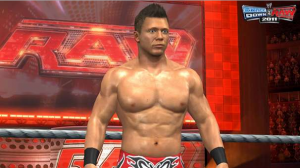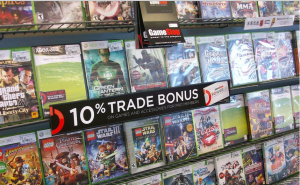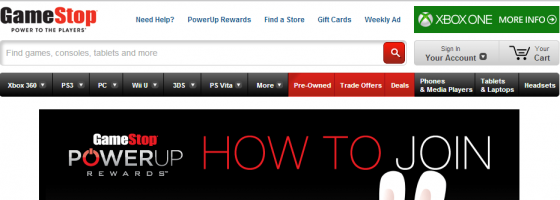The recent reveal of the Xbox One has brought another debate back to the forefront besides backwards compatibility: Used games. As we continue into the age of digital distribution and greater connectivity, publishers and designers have more control over their products than ever before.
But used games have been viewed by members of the game industry as a bad thing for some time compared to consumers and as it always seems to be the case: No one has a definitive answer.
The Second Hand Market:
Since video games have been sold, there has been the used game market. In the beginning the two big companies were Electronic Boutique and Babbages, but they eventually combined into GameStop (along with other smaller retailers) and became the premier video game store.
There are two basic facts that I want to make sure that we are all on the same page on before continuing:
- When you buy a new game from any retailer (digital or physical) both the store and the publisher/developer each get a piece of your sale.
- When you buy a used copy of a game, the store( or person) in question receives the full share of your sale and the publisher/developer gets none.
While the second point is pretty clear, it’s the first point that we in the public don’t exactly know the arrangement. Trying to find a straight answer on the web has not been easy. But we do know for sure that when it comes to point one, the publisher/developer clearly has the better deal regarding earning money over point two.
As you can tell, publishers don’t like used copies of games as it means that they don’t see any of the profit while the store gets it all. Over the years publishers and developers alike have expressed their displeasure and begged gamers to buy new.
But over the last decade with the rise of digital accounts, publishers could now control game content beyond the retail sale. EA introduced “Project Ten Dollar:” where major content in a title would have to be activated and tied to an account, preventing someone who bought it used from accessing it unless they spent more money.
Now EA has recently rescind this system, but for several years EA along with other publishers used it as a way to make sure that they were getting something back from used sales.
While the rise of digital sales has been the boon of digital stores like Steam, U-Play and so on, the destruction of the used game market has been a major criticism. Arguably it could be concluded that ideas like project ten dollar and the recent debate for the next console generation were inspired by digital retailers like Steam.

THQ was one of many publishers who released day one DLC content that could only be unlocked through new copies of their games.
When we talk about used games there are three distinct sides of the industry that are affected:
The publisher looking for more money and control, the developer trying to earn enough to continue making games and the consumer who is trying to enjoy their preferred hobby.
This is where the issue gets muddy — we as consumers don’t want to go broke enjoying games and want to support the companies we like. But said companies are tied to publishers and digital clients that restrict our ownership of the products we bought.
Now on the PC, there are far more ways to buy games new at a reduced price thanks to massive sales from just about every digital store. So that chances are, most people aren’t spending $50+ to play the games they want. But the same can’t be said about the console market and buying physical copies.
These high costs are both the reason and allure of used copies, as a way to buy games without breaking the bank and a way to earn back some money on games that you don’t play anymore.
But there is one question that is central to this topic: Who controls a game after purchase?
First Sale Doctrine:
While developers may argue that people should buy games new in order to keep them in business, the debate rages on as to who owns the copy of the game.
In any other medium: books, movies, DVDs etc, there is no debate as to the right to sell used copies of a product. And the seller is protected under law by the *first sale doctrine.
“If you’re selling millions of copies of a game at full price and you still aren’t breaking even, then there is a far greater problem then used game sales.”
The doctrine states that the owner of any copyrighted material is legally allowed to receive money from only the first legitimate sale of a copy of their material. After which, the consumer has the choice to resell the copy (or in other words “dispose of it”) on their own terms and keep the profit.
Also, the original copyright owner has no claim of ownership over the used copy once the original transaction has been completed.
Now of course there is the distinction between selling your copy and pirating it. You also don’t have the right to sell a copy that you yourself have pirated, only the copy that you purchased legally.
However publishers and developers know the law and have developed a loop-hole to control selling PC games. Nowadays when you buy a PC game the terms of service states that you are not actually buying a copy, but a “license” that allows you to play the game. That wording is a big deal, as the first sale doctrine only applies to legal possession of a copy of a work.
Last year there was big news that the European Union ruled in favor of the consumer and overruled the terms of service allowing gamers to sell used PC games. However, since then there hasn’t been any other news regarding this or if the law will come to the US.
Personally, my opinion favors the user in this case as why should video games be held to a different standard as every other product on the market? One of the pluses of being able to sell used games, is that the consumer knows that if they don’t like a game, that they can still make some of their money back.
With publishers and developers prohibiting used game sales, it forces the consumer in essence to gamble their money on a product that they may or may not like. As we talked about with AAA design selling out, it can be risky these days buying a game on day one. What happens if you buy a game like SimCity 5 or Aliens Colonial Marines on day one and are stuck with a $60 product that doesn’t work as advertised?

Used game sales are the cornerstone of Gamestop’s strategy and removing them from the industry would decimate the company.
One thing is for sure, it will make you far more hesitant to buy another game on day one. And will make waiting for game sales a more attractive option, which publishers don’t want to happen.
I know that both developers and publishers will argue that every dollar of profit helps keep them going, but I’m going to quote myself from an earlier post: “at what point does greed overtake necessity?”
If you’re selling millions of copies of a game at full price and you still aren’t breaking even, then there is a far greater problem then used game sales.
As more cases of this matter come up along with the eventual release of the PS4 and Xbox One, ultimately we will either have to see if the Supreme Court will have a say on this matter, or make our own choice and take a stand one way or the other. Either way I feel like we’re going to have to have an answer soon.
*information taken from: http://www.justice.gov/usao/eousa/foia_reading_room/usam/title9/crm01854.htm



Pingback: The Mixed Signals of the Xbox One | Game Wisdom()